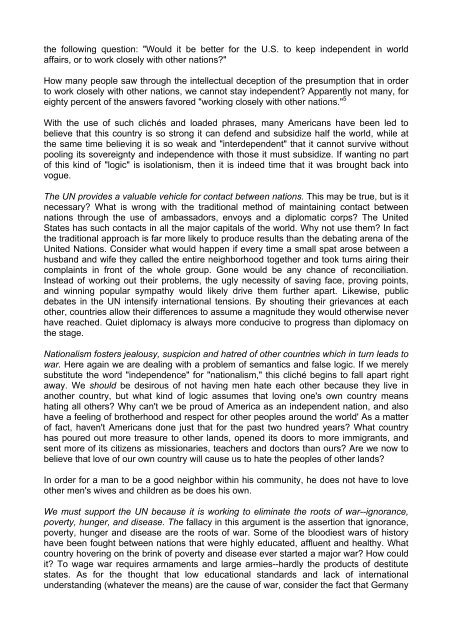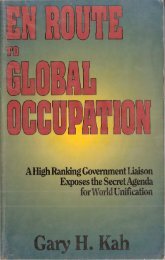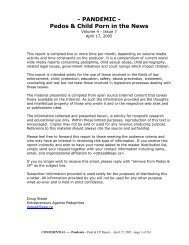G. Edward Griffin - The Fearful Master - PDF Archive
G. Edward Griffin - The Fearful Master - PDF Archive
G. Edward Griffin - The Fearful Master - PDF Archive
Create successful ePaper yourself
Turn your PDF publications into a flip-book with our unique Google optimized e-Paper software.
the following question: "Would it be better for the U.S. to keep independent in world<br />
affairs, or to work closely with other nations?"<br />
How many people saw through the intellectual deception of the presumption that in order<br />
to work closely with other nations, we cannot stay independent? Apparently not many, for<br />
eighty percent of the answers favored "working closely with other nations." 5<br />
With the use of such clichés and loaded phrases, many Americans have been led to<br />
believe that this country is so strong it can defend and subsidize half the world, while at<br />
the same time believing it is so weak and "interdependent" that it cannot survive without<br />
pooling its sovereignty and independence with those it must subsidize. If wanting no part<br />
of this kind of "logic" is isolationism, then it is indeed time that it was brought back into<br />
vogue.<br />
<strong>The</strong> UN provides a valuable vehicle for contact between nations. This may be true, but is it<br />
necessary? What is wrong with the traditional method of maintaining contact between<br />
nations through the use of ambassadors, envoys and a diplomatic corps? <strong>The</strong> United<br />
States has such contacts in all the major capitals of the world. Why not use them? In fact<br />
the traditional approach is far more likely to produce results than the debating arena of the<br />
United Nations. Consider what would happen if every time a small spat arose between a<br />
husband and wife they called the entire neighborhood together and took turns airing their<br />
complaints in front of the whole group. Gone would be any chance of reconciliation.<br />
Instead of working out their problems, the ugly necessity of saving face, proving points,<br />
and winning popular sympathy would likely drive them further apart. Likewise, public<br />
debates in the UN intensify international tensions. By shouting their grievances at each<br />
other, countries allow their differences to assume a magnitude they would otherwise never<br />
have reached. Quiet diplomacy is always more conducive to progress than diplomacy on<br />
the stage.<br />
Nationalism fosters jealousy, suspicion and hatred of other countries which in turn leads to<br />
war. Here again we are dealing with a problem of semantics and false logic. If we merely<br />
substitute the word "independence" for "nationalism," this cliché begins to fall apart right<br />
away. We should be desirous of not having men hate each other because they live in<br />
another country, but what kind of logic assumes that loving one's own country means<br />
hating all others? Why can't we be proud of America as an independent nation, and also<br />
have a feeling of brotherhood and respect for other peoples around the world' As a matter<br />
of fact, haven't Americans done just that for the past two hundred years? What country<br />
has poured out more treasure to other lands, opened its doors to more immigrants, and<br />
sent more of its citizens as missionaries, teachers and doctors than ours? Are we now to<br />
believe that love of our own country will cause us to hate the peoples of other lands?<br />
In order for a man to be a good neighbor within his community, he does not have to love<br />
other men's wives and children as be does his own.<br />
We must support the UN because it is working to eliminate the roots of war--ignorance,<br />
poverty, hunger, and disease. <strong>The</strong> fallacy in this argument is the assertion that ignorance,<br />
poverty, hunger and disease are the roots of war. Some of the bloodiest wars of history<br />
have been fought between nations that were highly educated, affluent and healthy. What<br />
country hovering on the brink of poverty and disease ever started a major war? How could<br />
it? To wage war requires armaments and large armies--hardly the products of destitute<br />
states. As for the thought that low educational standards and lack of international<br />
understanding (whatever the means) are the cause of war, consider the fact that Germany



![Robert T McQuaid [rtmq@stn.net] Sent: Friday, October 29, 2004 12 ...](https://img.yumpu.com/51070071/1/190x245/robert-t-mcquaid-rtmqstnnet-sent-friday-october-29-2004-12-.jpg?quality=85)







